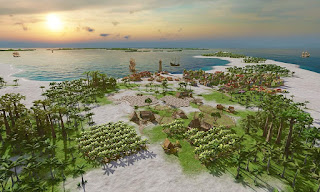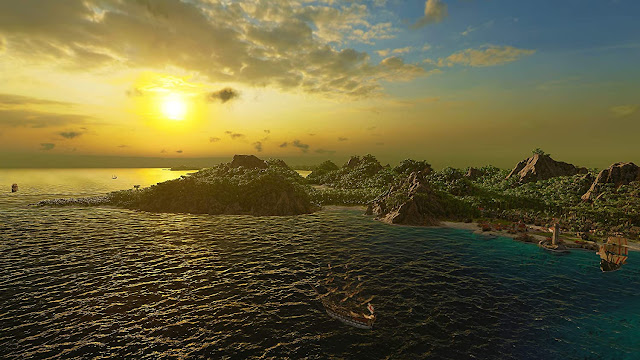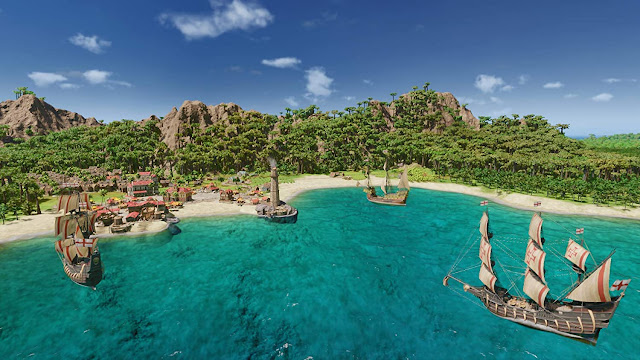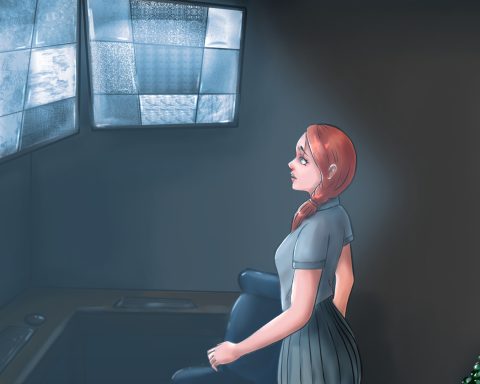Kalypso really picked the wrong time to release Port Royale 4 on Nintendo Switch. It’s been out for a fair few weeks now, but with all the JRPGs, visual novels, and other things that have been landing on the console too, I’ve only had time to play this in short bursts here and there. That’s my excuse for why this review is so late, anyway, and I’m sticking by it. What I will say is that if you did overlook it on launch in late May, however, do use this review as an excuse to go back and look at it again, because this is currently the best simulator going on the console.
Of course, it doesn’t look up to the same standards of the game on PlayStation 4 (you can read my review of that version here). The graphics are a noticeable step downwards in terms of resolution and fidelity, and that lends the world a grainy look that is disappointing, given the gorgeous Caribbean vibe of the game on the other platforms. There are also some noticeable loading times that disrupt the flow of the action just a little too much, and the frame rate does noticeably stutter at times. It’s hardly an issue, since this is a simulation game and entirely disinterested in testing reflexes, but it’s all worth nothing in the context that if the presentation is your only priority, the other versions are superior.
On the other hand, Port Royale 4 lends itself really comfortably to the handheld, portable experience. Because the systems are relatively efficient, there’s a good pick-up-and-play quality about the game that makes it good for short bursts of play, and the calm pacing also means that it’s ideal to play while splitting attention between two things at once (for example, watching a movie and playing at the same time). It’s the perfect Switch experience, in other words, and for me, at least, that’s more than worth the technical compromises.
Otherwise, there’s nothing that distinguishes this Switch version from the PlayStation 4 edition. It remains the same highly accessible blend of city builder, trading manager (by low, sell high, from one end of the Caribbean to the other), and turn-based ship-to-ship combat simulator. Port Royale 4 takes place at the exact period of history that you expect it would – the golden age of piracy, where England, Spain, The Netherlands and France square off to exploit the South-East of North America, the North-East of South America, and the Caribbean islands for their own wealth, and pirates and privateers exploited the conflict between the four great nations to their personal wealth. It is the ideal era for the various tactical and strategic systems that the developers have implemented into the game, and while the history itself is a light touch, you do feel like you get a sense of the dynamics of the period from the game.
There is an argument that you could make that the developers could have used it as a teaching moment more. The idea that the Caribbean was all about glory, empire-building and wealth accumulation does overlook the very real impact that these empires had on the region – an impact that continues to reverberate to this day – and overlooking it does come across as a little irresponsible. There are diplomatic systems at play through the game, and it’s possible to build a reputation with the various national leaders so that they hand control over the growing towns to your management, so the game does depict the colonialism at play. It just misses the need to actually engage with that topic if it’s going to represent it. As I noted in my review on PlayStation 4 Port Royale 4 does come across as perpetuating a kind of exoticism, and it’s unfortunately inauthentic as a consequence.
With that being said, I really do love this game. As I also wrote in my previous review (which I’m reprinting here because I’m too lazy to re-write the same review twice): For a game that’s juggling a lot of balls – from establishing shipping routes, to carefully designing towns to maximise both productivity and contentedness, and tackling the threat of pirates, Port Royale 4 is surprisingly accessible. In comparison to a game like Europa Universalis or Crusader Kings, where the economic systems at play are unwieldy to the point of being overwhelming, Port Royale keeps things simple, with some nice visual sliders highlighting the demand for a good in any given city, giving you the information you need at a glance to determine whether you want to trade or hold on to your goods.
Meanwhile, ship-to-ship combat involves everything that you’d expect it to. There’s the slow turning arcs of the ships of the time to contend with, through to the relative strengths of those ships being determined by everything from captain’s brilliance to number of crew and cannons (and there are boarding and melee mechanics, too). Despite this, the tactical action is clean, logical, and the game teaches you everything you need to know in the span of a single five-minute tutorial.
Building cities is similarly deep, but mechanically accessible thanks to the development energy placed into getting the user experience right. Each building has an impact (possibly positive, possibly negative) on the buildings around it, and the game helpfully pops up a colour gradient to show you whether that new building that you’re looking to construct will be in a good spot, or potentially drag down the quality of the facilities around it. It’s a challenging puzzle to sort through at times because space is at a premium in each city and there are a lot of possible buildings available, but you’ll never struggle to understand the impact of the decisions that you make, and that is key for any simulator or strategy game.
Port Royale 4 is a wonderful game, and the compromises that were made to bring it to Nintendo Switch are minor and easy to overlook. This is the kind of simulator that you can end up spending hundreds of hours with, and as one of the rare genres that aren’t over-represented on the console, this is an excellent first port of call for genre fans looking for some on-the-go thinkies.










